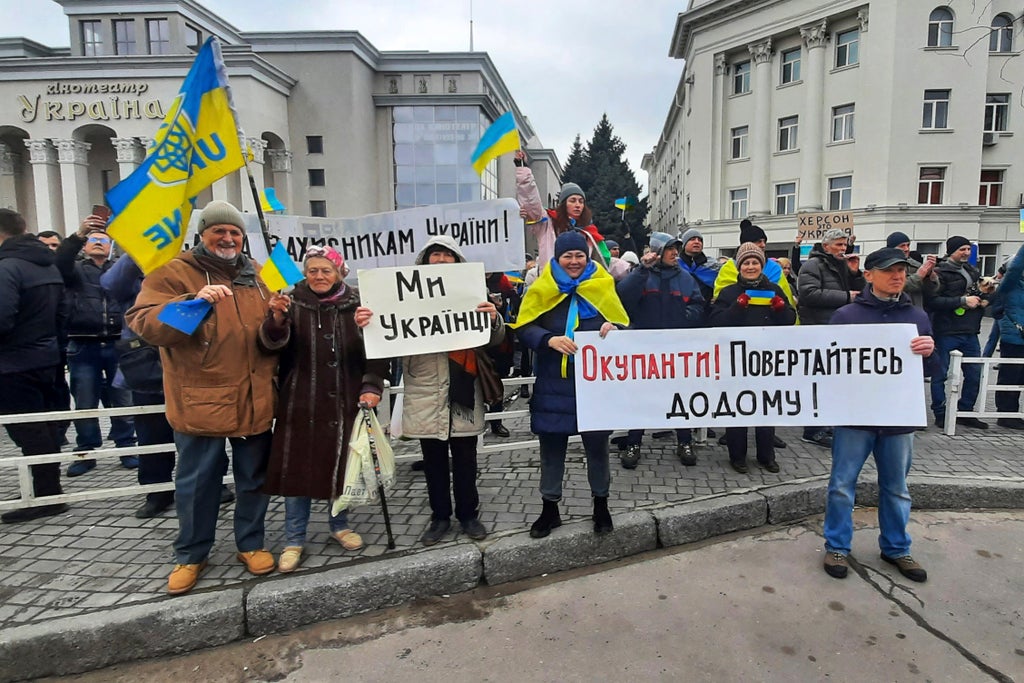
KYIV, Ukraine — Ukraine’s General Staff says Russia is increasing the pace of its offensive in the east of the country, the goal of which is to take full control of the Donetsk and Luhansk regions and have a land corridor to Crimea.
The Russian forces “are exerting intense fire” in almost all directions, the General Staff said in their Thursday morning update, with the “greatest activity observed in Slobozhanske and Donetsk directions.”
Strikes on Kharkiv, Ukraine’s second largest city, continue, the update said, and more forces have been moved to the city of Izyum. In the Donetsk direction, the Russian troops are focusing on encircling the Ukrainian forces.
Over the past 24 hours, the Ukrainian forces have repelled six attacks in the Donetsk and Luhansk regions, the General Staff said.
___
KEY DEVELOPMENTS IN THE RUSSIA-UKRAINE WAR:
— European leaders blast cutoff of Russian gas as ‘blackmail’
— Key players urge accountability for atrocities in Ukraine
— A chilling Russian cyber aim in Ukraine: Digital dossiers
— Russia releases US Marine vet in surprise prisoner exchange
Follow all AP stories on Russia's war on Ukraine at https://apnews.com/hub/russia-ukraine
___
OTHER DEVELOPMENTS:
KYIV, Ukraine — Serhiy Haidai, the governor of the Luhansk region, says Thursday that four civilians have died in the region over the past 24 hours and four more were wounded.
The Russian shelling has also destroyed 10 houses in the city of Popasna, Haidai said in the messaging app Telegram.
“The Russian army shelled the residential area in Luhansk region for 29 times by aircrafts, multiple rocket launches, tube artillery and mortars,” Haidai wrote. “The enemy shelled Popasna and Lysychansk for 10 times, and Hirske for four very long times.”
___
CAMP ATTERBURY, Indiana — The war in Ukraine has National Guard troops in the U.S. state of Indiana preparing equipment for transport to help Kyiv fight Russia.
Footage released by the Indiana National Guard on Wednesday show them preparing M113 armored carriers.
The M113 is an older armored carrier dating back to the 1960s and the height of the Cold War between the U.S. and the Soviet Union.
But these armored carriers still run and appear to be battle-ready. At Camp Atterbury, just south of Indianapolis, Guardsmen checked their treads, engines and other equipment before loading them onto trucks to send to the battlefield.
It’s part of a massive effort by the U.S. and other Western allies to arm Ukraine.
___
KYIV, Ukraine — In the southern Ukrainian city of Kherson, a series of explosions boomed near the television tower late Wednesday and at least temporarily knocked Russian channels off the air, Ukrainian and Russian news organizations reported.
The Russian state news agency RIA Novosti said missiles and rockets were fired at the city from the direction of the Ukrainian forces to the northwest.
Kherson has been occupied by Russian forces since early in the war.
Ukrayinska Pravda, an online newspaper, said the strikes set off a fire and knocked Russian television channels off the air.
RIA Novosti said the broadcast later resumed. It said Russian channels began broadcasting from Kherson last week.
Russia has been determined to strengthen its control over the city, but residents have continued to come out onto the streets to protest the occupation.
___
BERLIN — An independent research group says Germany was the biggest buyer of Russian energy during the first two months since the start of the war in Ukraine.
A study published by the Centre for Research on Energy and Clean Air calculates that Russia earned $66.5 billion from fossil fuel exports since Russian troops attacked Ukraine on Feb. 24.
Using data on ship movements, real-time tracking of gas flows through pipelines and estimates based on historical monthly trade, the researchers reckon Germany paid Russia about 9.1 billion euros ($9.5 billion) for fossil fuel deliveries in the first two months of the war.
The German government says it can’t comment on estimates and declines to provide any figures of its own.







